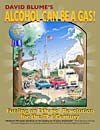
![]()
Search the Journey to Forever website – click HERE
|
Journey to Forever: Make a donation |
Navigation
Contact usTo Keith Addison Handmade Projects |
 Free heating! Free heating!Roger Sanders has updated his popular improved version of the Mother Earth News waste oil heater with a great deal of new information and new options. This waste oil heater solves all the problems that made the original MEN version difficult to use. Roger's design is simple and reliable -- it's easy to build and easy to use, it's quiet, it uses no electricity, it's easy to light, easy to clean and easy to control, it has a wide heat range, and it runs on waste vegetable oil (WVO) just as well as on used engine oil. It can save you thousands of dollars in heating bills. The Second Edition is available as a pdf e-book, price $22.50. Complete DIY instructions -- buy it HERE. Spanish Spanish-language version HERE. |
New! Make your own ethanol fuel
Build a 3-inch ethanol still
Journey to Forever's 3-inch ethanol still makes up to 5 gallons (19 litres) per hour of high-proof alcohol fuel, ready to use. Your car will run faster, cooler, and better on ethanol – and you'll save money on fuel.
Anyone with basic backyard DIY skills can build the still. A new, large-size blueprint shows the sections of the still in full-sized detail, and the 41-page e-book manual tells you everything you need to know to build the still and operate it. It's a complete package.
Click HERE
Ethanol fuel
Introduction Ethanol is made by fermenting and then distilling starch or sugar crops such as sugar-cane, maize, sorghum, wheat and other grains, or even cornstalks, fruit and vegetable waste. Ethanol is a much cleaner fuel than petrol (gasoline): As with biodiesel, you don't have to be a corporation to make ethanol -- you can make fuel alcohol in your backyard, and many people are doing just that, and running their vehicles on clean-burning alcohol instead of gasoline. Two copies of the application should be sent to the TTB National Revenue Center. The address is: Permits are free, and entitle you to make up to 10,000 gallons (38,000 litres) of ethanol fuel at home for personal use per year. Ethanol is a very high octane fuel, replacing lead as an octane enhancer in gasoline. Ethanol fuel production is a good locally-based industry, providing local jobs and a market for local materials, and helping to keep money and investment within the community. That's why so many of the farming states in the US (and Canada) back ethanol fuel. Ethanol is a highly efficient fuel. A study by the Institute of Local Self-Reliance in the US found that using the best farming and production methods, "the amount of energy contained in a gallon of ethanol is more than twice the energy used to grow the corn and convert it to ethanol".
What is ethanol?
The benefits
Backyard ethanol
How does it work?
Production
Energy balance
-- Is ethanol energy-efficient?
-- Food or fuel?
How-to books
Ethanol and your car
Forums
General information
Small-scale ethanol
Ethanol from cellulose
Ethanol biodiesel
Hooch
Ethanol -- schools projects
Ethanol (ethyl alcohol, grain alcohol), according to the US Department of Energy's National Renewable Energy Laboratory, is a "clear, colorless liquid with a characteristic, agreeable odor" -- and taste, some would add.
This is the drinkable (though toxic) alcohol, the active ingredient in beer, wine and spirits. Methanol (methyl alcohol, wood alcohol) is much more poisonous and isn't drinkable at all, it kills people.
Ethanol is also a high-performance motor fuel that cuts poisonous exhaust emissions and is better for the environment.
Henry Ford designed the famed Model T Ford to run on alcohol -- he said it was "the fuel of the future". The oil companies thought otherwise, however -- but the oil crisis of the early 1970s gave ethanol fuel a new lease of life.

The Model T Ford was built to run on ethanol.
The US leads the world in ethanol production (ahead of Brazil), with 7 billion gallons of cleaner, ethanol-blended gasoline used in 2007, about 12% of fuel sales in the US. Most of it is E85 (85% ethanol 15% gasoline) or E10 (10% ethanol 90% gasoline), which most gasoline cars can use without engine conversion.

Henry Ford
Ethanol blends are increasingly used in South Africa, while Brazil, the world's ethanol fuel success story, produces four billion gallons of ethanol a year. All Brazilian fuel contains at least 24% ethanol, and much of it is 100% ethanol. Many other countries are implementing ethanol fuel programs.
Chrysler, Ford, and General Motors all recommend ethanol fuels, and nearly every car manufacturer in the world approves ethanol blends in their warranty coverage.
More than two trillion miles have been driven on ethanol-blended fuels in the US since 1980.
What is ethanol?
"Alcohol Can Be a Gas! -- Fueling an Ethanol Revolution for the 21st Century" by David Blume, International Institute for Ecological Agriculture, California, 2007, 594p.

David Blume's book is the new bible of small and medium-scale ethanol fuel production, the product of Blume's 30 years of hands-on experience with ethanol production plus four years of full-time research on all aspects of the subject. Essential reading for anyone interested in biofuels, ethanol and other. Order online at Amazon.com: Alcohol Can Be a Gas! -- Read Journey to Forever's review here.
The benefits
Backyard ethanol
It's more equipment-intensive than biodiesel. You need a still, and you need to learn how to ferment beer. You can build your own still, and there's good information available to help you learn what you need to know.
You'll find everything you need in our Resources section and in the Biofuels Library.
Permits: In the US, home brewers need to get a "small fuel producer" permit from the US Alcohol and Tobacco Tax and Trade Bureau (TTB).
Download the form here:
http://www.ttb.gov/forms/f511074.pdf
Alcohol and Tobacco Tax and Trade Bureau
National Revenue Center
550 Main Street, Suite 8002
Cincinnati, Ohio 45202
Tel. 1-855-882-7665
Email: ttbquestions@ttb.gov
Other countries have similar rules. Contact the national authority in your country and find out what's required. How does it work?
Fuels that burn too quickly make the engine "knock". The higher the octane rating, the slower the fuel burns, and the less likely the engine will knock.
When ethanol is blended with gasoline, the octane rating of the petrol goes up by three full points, without using harmful additives.
Adding ethanol to gasoline "oxygenates" the fuel, adding oxygen to the fuel mixture so that it burns more completely and reduces polluting emissions such as carbon monoxide.
Ethanol and ETBE oxygenator, made from ethanol, are much safer than the toxic and polluting MTBE fossil-fuel-derived oxygenator used by oil companies. Production
One ethanol plant owned by farmers in Minnesota processes 11,751 bushels of grain a day to produce 33,990 gallons of ethanol and 95 tons of high-protein livestock feed.
If you happen to have a spare acre in your back yard, you can raise enough maize to make enough ethanol to drive even a 17mpg gas-guzzler about 5,000 miles, along with enough animal feed to help keep you in eggs and chicken.
If the climate favours sugarcane, an acre's worth will take you nearly 15,000 miles. A few fruit trees would help a lot too. You could put the by-product in a digester, along with other organic wastes, to produce methane gas for cooking -- or as a heat source for the distillation process.
Alcohol yield tables (for 30 different feedstocks), showing: Average yield of 99.5 percent alcohol per ton; Average yield of 99.5 percent alcohol per acre.
Energy balance
The US Department of Agriculture says each BTU (British Thermal Unit, an energy measure) used to produce a BTU of gasoline could be used to produce 8 BTUs of ethanol.
The non-profit American Coalition for Ethanol says ethanol production is "extremely energy efficient", with a positive energy balance of 125%, compared to 85% for gasoline, making ethanol production "by far the most efficient method of producing liquid transportation fuels".
See:
Is ethanol energy-efficient?
Food or fuel?
Ethanol resources on the Web
Ethanol -- schools projects
See Biofuels > Biodiesel > Ethanol
Biofuels
En español -- Biocombustibles, biodiesel
Biofuels Library
Biofuels supplies and suppliers
Biodiesel
Make your own biodiesel
Mike Pelly's recipe
Two-stage biodiesel process
FOOLPROOF biodiesel process
Biodiesel processors
Biodiesel in Hong Kong
Nitrogen Oxide emissions
Glycerine
Biodiesel resources on the Web
Do diesels have a future?
Vegetable oil yields and characteristics
Washing
Biodiesel and your vehicle
Food or fuel?
Straight vegetable oil as diesel fuel
Ethanol
Ethanol resources on the Web
Is ethanol energy-efficient?